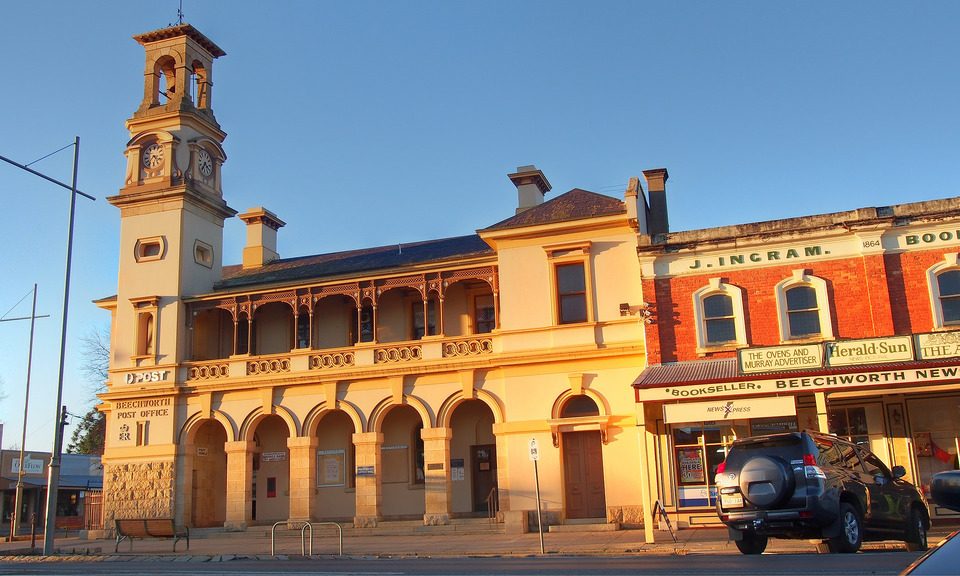‘Perpetual Water’
Telstra & tourism leadership in Gippsland (Vic)
October 5, 2006NAB Indigenous MBA scholarship changes a life
October 6, 2006The new Perpetual Water system turns grey water blue
A new grey water treatment system can turn up to 750 litres of grey water into safe, high-quality, clear water daily, which should be enough to ‘drought proof your property’ and turn water normally discarded into a ‘renewable resource’.
The Farmers’ Info e-newsletter reports that ACT innovators Perpetual Water, who have earned nation-wide recognition for a unique domestic water recycling system, have been awarded a $720,000 Australian Government grant to apply the technology to residential apartment buildings.
The system has been subject to extensive government review and testing and has already won several innovation awards. It was featured on ABC TV’s New Inventors Program in late July.
How it works
Perpetual Water is a fully automated, simple-to-use system that runs silently outside of the house. A specially designed computer operates with the flick of a switch and doesn’t require any special attention. It uses minimum power and only needs to be serviced once a year by a technician.
The system has 11 sensors to ensure the system operates effectively and if a problem is detected the system automatically turns itself off. It also comes with safety taps and separate pipes to ensure treated water is never mixed with drinking water.
Four steps
1. Grey water from the shower, bath, sink and washing machine is collected in a sump tank, buried underground, which removes hair, lint and other physical contaminants.
2. The water is pumped to a settling tank.
3. The water is pumped through Perpetual Water’s patented Active Adsorption Filtration™ system, producing water that looks and smells like tap water.
4. The safe, clean water can be stored in a reuse tank ready for perpetual household use.
Safe use
Unlike other grey water systems, Perpetual Water can be used over the long term without causing health and environmental risks. It is safe to use for:
- watering the garden, including vegetables and fruits;
- watering the lawn;
- washing the car;
- washing clothes by hand or in the washing machine;
- flushing the toilet;
- hosing down pavers;
- filling ponds;
- washing windows.
Not safe use
Even though the water is Class A and looks and smells like clean tap water, it is recycled and BY LAW must NOT be used for:
- drinking (human or animal consumption);
- bathing;
- showering;
- filling swimming pools;
- washing dishes by hand or in a dishwasher.
Can anyone give us a firsthand report on the system?



8 Comments
I have just got a PW system installed – it has been running for a couple of days now. The system is very smart, and PW are keen to tailor the operation of it to our lifestyle. They have certainly thought of everything, and our storage tank is now rising with water for irrigation, and flushing. The system is dead easy to “use” (just turn the tap) unlike some half-baked technology you come into contact with.
Sydney Water, NSW Health and Blue Mountains City Council are still getting their head around it since the technology is new to them. We got a bit of head-scratching from them, but it should be much easier now that everyone is starting to get to know the system.
In my situation, a two person family, there is not enough grey water generated to run the system optimally ( only 500 l per day average) so the recovery rate would be down. Even at optimum recovery , the costs run in the order of $30 to $35 /Kl compared with mains water at $1.88/Kl.. The higher cost is associated with retrofitting with pipe in slab plumbing, others may well be cheaper but the piddling 1100 l storage allowed in the budget is totally inadequate to cope with any form of water shortage in a realistic manner
The cost of $30/35 per. Klitre seems a bit steep?
Any idea how this is calculated?
Depreciation, Interest, Maintainence, Electricity???
Merv.
No idea Merv. You would have to contact Perpetual:
Phone
1300 856 570 (within Australia)
+61 (0)2 6162 0650
Email
sales@perpetualwater.com.au
Fax
+61 (0)2 6162 0651
Address
PO Box 6112
PHILLIP ACT 2606
Australia
Richard Windsor – at capacity the unit will produce up to 240kL per annum. If it costs $30 per kL then its operating cost is $7,200 (240kL x $30) per year to run.
My, I think you could be a tad wrong – but please, prove me mistaken and share your calculations.
The actual cost of Class A recycled grey water is probably around $2.00 per kL. This figure can go as high as $4.00 depending on how the capital cost is accounted.
Therefore, the cost of Class A recycled water is slightly more than mains water – although in places such as Canberra, the max cost of water exceeds $3.12 per kL; even this relatively high price is heavily subsidised and doesn’t account for the embedded energy cost of moving millions of tons of water about the country.
Richard – your point about the size of the tank is ill informed and wrong. The point about recycling grey water is that it is produced and used on a daily basis. A domestic household only needs a 1500 – 3000L tank. That’s one of the advantages, not disadvantages of these systems.
Thanks for your input Denise!
i have a pw unit in my house and if you put a buffer tank in you can put the unit on constant batching so it will do a lot more than 240kl per annum….as soon as its empty it starts filling again………………..simple.
We will be retiring on the Atherton tablelands@ Yungaburra behind Cairns.WE are currently doing an owner build so I can plan for this, can you please supply the cost of your device including the approximate cost of fitting.